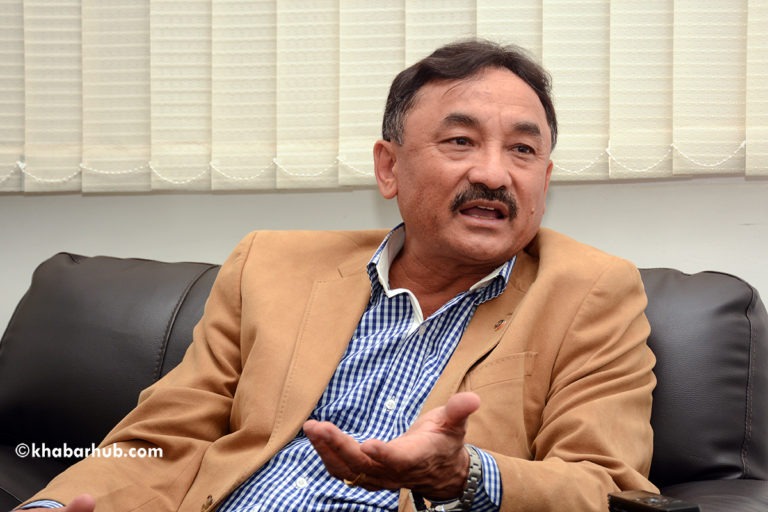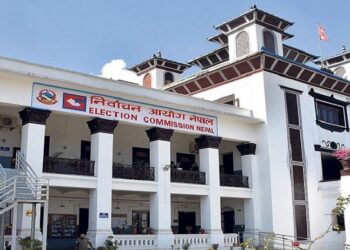KATHMANDU: Government of Nepal has accepted the role of private sectors in the country’s development. It is not hidden from anyone as to how private sectors in Nepal have transformed all the major sectors of economy agriculture, industry, transportation, communication, health, education, and others.
However, because of some of the policies of the government, Nepali traders, businesspersons, and industrialists are vexed in them in their day to day operation. Frequently changing the business policy of Nepal has unsettled the business community. It is ironical that the government devises policy and laws for business and trading community of Nepal but hardly cares to take inputs from them.
The present problems that business and trading community are facing in Nepal are attributed to the government’s failure in discussing all the things in advance with all the stakeholders before it goes to frame policies and laws. The government recently went back on its own decisions to implement the provisions of PAN (Permanent Account Number) and Vehicle and Consignment Tracking System (VCTS).
In face of rising trade deficit, liquidity crunch, and high-interest rate, Khabarhub caught up with thoughts and suggestions given by Pradeep Kumar Shrestha, Managing Director of Panchakanya Group and former president of the Federation of Nepalese Chamber of Commerce and Industry (FNCCI).
Besides, Shrestha has been serving as the Honorary Consul of South Africa in Nepal for the past 16 years. He has also served as vice president of the Confederation of Asia-Pacific Chambers of Commerce and Industry (CACCI) and among others. Excerpts:
You have been leading a conglomerate of Panchkanya group. You must have encountered problems at the level of policy and laws during previous governments’ regime. Now that stable government is in charge, exhorting the nation to walk on the path of prosperity and development. What is your experience? Is the present government really acting in the direction of achieving prosperity and development of the country?
Nepal was really advancing towards the goal of political stability and the level of confidence of business community was also rising up particularly after the present government of the Nepal Communist Party (NCP) under the Prime Minister K. P. Oli assumed the office on 17 May 2018 last year.
State of uncertainty was prevailing in the country during the regimes of previous governments due to political instability as no investors – be it from Nepal or from outside felt confident enough to invest here. Now, we can declare to the whole world that there is a stable government in Nepal. Lately, we have realized that stability in political terminology is all about numbers but they are the same people who have been influencing the policy of Nepal before this stable government.
If their mindset towards economy and commerce of Nepal does not change, no positive environment will be created even after the formation of the present stable government, as being touted in media and everywhere. We have heard about factions within the ruling party and the heat of internal conflicts naturally affect the functioning of the Government. We are all worried about it as it will definitely affect our trade and business.

What exactly is the reason? Now that we have ex-Governor of Nepal Rastra Bank guiding as Finance Minister who is known for his fine knowledge on both national and international economy. What do you think what is stopping him to go in for a blaze of economic reforms to revamp the domestic economy?
I may be wrong but what I think he has been long exposed to the world of money and finance. It is not fair, as I think, to compare him with any other finance minister of Nepal so far his experience and knowledge are concerned. We hail the current Finance Minister as a noted economist; I have no doubt about his caliber as he has performed well in Nepal Rastra Bank and National Planning Commission.
However, as a citizen of this country and a businessperson, I have every right to ask why Nepal is going down in trade, business and in the overall economy under the leadership of present finance minister Dr. Yuvaraj Khatiwada.
I am worried as to why his policies when launched on the ground meet with failure. I understand his positive thoughts and reformatory steps for better health of Nepal’s economy. However, the ways policies are failing to bring positive effects in Nepal’s economy will deter the investors both from inside and outside Nepal to explore business opportunities here. The government has gone wrong in implementing (executing) these policies at the right time in the right manner.
The government failed to do its homework before executing these policies which boomeranged on our face creating fear and chaos in business and trading community of Nepal. I am not trying to be pessimistic in my thoughts as I have felt there are so many other areas where the government has done very good work. If traders and businesspersons oppose certain provisions, it does not mean that they will not accept these reforms and changes brought out by the government.
The current protest and opposition only indicate the mistiming and miscalculation to launch reforms. Even in India, there is a culture of holding discussion with all the stakeholders before important policies are launched by the government. There is a great difference in policy execution between India and Nepal because India has well-oiled federalism working at all levels while Nepal has adopted federalism just a few months ago.
Again, there is a difference at the level of productivity of workers, patterns of work and stage of development both the countries have reached in. I am not questioning the intention and spirit of the government regarding the implementation of reformative steps taken by the Nepal government. It is just a matter of timing that didn’t click for the latest reforms brought by the government.
Given the geographical location of Nepal where China is situated in the North with 1.35 billion population and India in the south with 1.25 billion people, we have a great business prospect in terms of consumers reach. You being a business owner are leading the Panchkanya Group. What are the opportunities, problems, and challenges that Nepali businesspersons and traders are facing at the moment?
The way we are viewed is itself a problem. Businesspersons and traders are risk-takers; they are not profiteers. And, undertaking an economic activity in an organized manner by following the land of law is not a crime; it is a business. It is not a crime to earn a reasonable profit from any business and trade undertaking.
However, it is unfortunate that we have been not able to utilize that profit in the most productive manner to our satisfaction. Nepal being a landlocked country has its own limitations and challenges but it has its own advantages which cannot be ruled out. China and India have not stopped us to set up Nepali businesses in their countries but problems lie with our own initiatives because our productivity and support from our own government to develop infrastructure and manufacturing base in the country.
The loss of confidence from the business and trading community with the Government of Nepal is the biggest loss as it is going to harm our domestic economy. Just take the example of ‘Foreign Investment Summit’. The government had assured all the Nepali investors to make an investment in US$ for entering into PPP (Private-Public Partnership) for generating 100 MW capacity hydroelectricity.
Many investors came forward to lend their helping hand to enter into PPP for generating hydroelectric in Nepal but lately, the government has changed its stance and refused to recognize the validity of PPP contract in US $ terms. It makes the investors insecure as their investment within the country is not safe at all.
It means that FDI (Foreign Direct Investment) will be adversely affected if the government does not recognize the investment in US$ currency.
Yes, absolutely. Every policy decision requires periodical review and half-implemented policy must not be withdrawn abruptly. It gives wrong signals to stakeholders as the government being confused itself in most of the policy matters. This will destroy the business environment of investment in Nepal.
Investors will be fearful of the government’s sudden decisions to go back in its own words. Tamor is a big project; and it has raised the question of investment in Kabeli. If the World Bank refuses to give us the loan, the entire project will sink. It means that public money will sink. I don’t think there is any chance of foreign investment of Government of Nepal does not have clarity on its policy and implementation of it.
It is said that Nepal has a very weak prospect for manufacturing industries. It is because raw materials are to be imported from foreign countries and manufactured products of Nepal cannot compete with parallel products produced in other countries. How do you see this proposition?
Nepal should understand it very well that two-third population is living just by the side of Nepal in all directions in China and India. We can draw benefits from the geographical proximity of China and India. Unfortunately, our workforce is migrating to other countries in search of a job. According to an estimate, half a million youth are leaving the country every year for foreign destinations.
If we want them to stay here, the government must revamp domestic economic sectors such as agriculture and tourism. Then comes the manufacturing sector which can absorb scores of workers in Nepal. There are many countries which are import-based exporters due to the strength of their manufacturing sectors. Singapore, Taiwan, and Japan do not have raw materials, even then these countries are manufacturing hub and counted amongst one of the strongest economies in the world.
Nepal has an immense possibility in exporting hydroelectricity but the country is sleeping over it. We are relatively stronger in industries like carpet, cement, and garment and steel. We must build upon our strength first. The government can provide all the manufacturing industries electricity at a cheaper rate. For that to happen, the government of Nepal has to produce it in its first place which is not happening for years or so.
India is our largest trading partner. We have seen how rich India is growing faster all due to investment in manufacturing sectors both from domestic and foreign investors. There are industries which are leading in the world in both productivity and earning the profit. Nepal has not yet created investment-friendly identity, leave alone setting up big industries in Nepal.

Till recently, Nepal was exporting carpet and garments. Things have changed in the opposite. Why? What are the problems?
All the who’s who of Nepal, seeing the returns, began to invest in the garment industry. We started competing with other countries in the export of garments unethically. The same thing happened in the carpet industries. All the carpet exporters of Nepal clashed in reaching out to the international market. Both garments and carpets fell down due to our own selfish nature of seeking filthy profits from export. The present situation is that Nepal imports garments and carpet from other countries now. We should do business on our own strength and must not copy others.
Nepal Government is aiming to transform the country with the slogan ‘Happy Nepali, Prosperous Nepal’. What do you think about it? Is not the flight of capital taking place from Nepal to other countries?
Earlier, people used to invest in land and property. These are tangible property. Nepal Rastra Bank discouraged such investment by tightening the sanctions of loans for investment in land and property. Now, we see people are moving towards buying gold and silver in the name of investment. Shares are always volatile so common people do not take risk much by buying shares.
Nothing transformative took place in the country’s economy after Government restricted the investment in land and property. Of course, foreign investors are not coming to Nepal. We had expectations from NRN (Non-Resident Nepalese); that too crashed down. NRNs are also not very confident about the security of their capital in Nepal. We do not mislead the Government. We speak exactly the same as we see the situation on the ground because the business has nothing to do with a political agenda.
So, there is no way FDI will enter Nepal as a country lacks environment?
It is not that we do not have the environment. It is just not meeting the expectation as promised by the Government of Nepal. Government has not given time to even Nepali businesspersons to take stock of their problems and challenges. Government is busy in fulfilling political agenda after which will turn to economic agenda, as it appears.









Comment